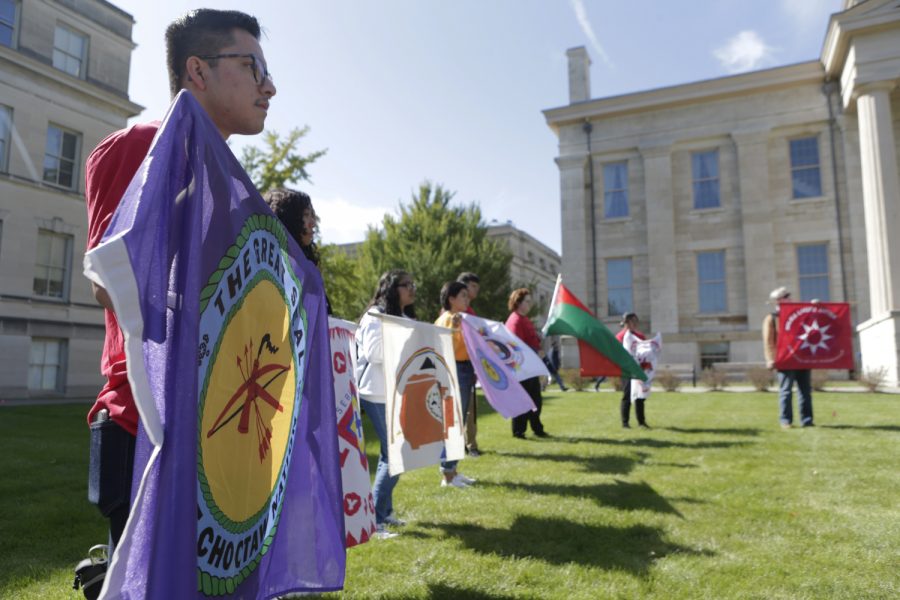Opinion | Educate yourself on Iowa’s Native American history
America’s school system cannot be trusted to accurately teach history, and next month we need to take it upon ourselves to learn Indigenous history.
Rally attendees hold flags representing various Native American tribes during the decolonization rally on the Pentacrest on Monday, Oct. 15, 2019. The rally featured speakers and music.
October 25, 2021
November is Native American Heritage Month, and it’s important to spend time educating ourselves on Native American history. Growing up, my knowledge of Native American history was limited to the Trail of Tears, Pocahontas, Sacagawea, and the misrepresentation of pilgrims and Native Americans uniting.
In addition to the misinformation and erasure of Native history in my education, there was no connection between Native peoples and Native history in Iowa, despite the state being named after the Native American tribe, the Ioway tribe. My own high school used to have a Native American Chief Head as a mascot until it was deemed offensive.
Why are we so comfortable misusing pieces of Native American culture and peoples without working to educate ourselves on the ongoing injustices Native communities face?
This year, many states, including Iowa, made the move to recognize Indigenous People’s Day in place of Columbus Day. While this initiative is important and necessary, there is still a large disconnect between Native history and what we are taught.
As long as we ignore and accept the erasure of this population, we will not be able to address the ongoing injustices that Native Americans face.
Information has begun to surface around the Native American boarding schools in Canada and the U.S. that inhumanely focused on forcing Native American children out of their culture. Many children from Iowa were forced out of their homes and into these boarding schools.
Native children in Iowa were taken to the Indian Training School at Toledo, next to the Meskwaki Settlement in Tama. There was a lot of resistance to sending children to the school, which resulted in little attendance. However, many Meskwaki children were sent to schools farther away to endure abuse and cultural erasure at these institutions later on.
Earlier this year, the remains of nine children were brought home to the Meskwaki settlement in Iowa from a boarding school in Pennsylvania.
Their names are: Lucy Pretty Eagle (Take the Tail), Rose Long Face (Little Hawk), Ernest Knocks Off (White Thunder), Dennis Strikes First (Blue Tomahawk), Maud Little Girl (Swift Bear), Friend Hollow Horn Bear, Warren Painter (Bear Paints Dirt), Alvan (Kills Seven Horses), and Dora Her Pipe (Brave Bull).
There are no reparations that could undo the losses Native communities face, but we need to recognize past tragedies and their effects on communities in Iowa.
Along with understanding U.S. history and Native peoples, there are struggles in Native communities today that go unnoticed. In 2016, 5,712 Indigenous women were reported missing by the National Crime Information Center. However, the U.S. Department of Justice reported only 116 of these case in its missing person database.
Indigenous women and girls are murdered at rates 10 times higher than any other ethnic group. Additionally, the third highest cause of death for Native women is murder. Often these instances of violence, murder, and missing women go unrecorded.
America’s education system continuously fails to address the full scope of America’s history and the atrocities that lie at the center of our country. Although a month dedicated to Native American history is important, that is not enough to bring injustices toward Native Americans to light. We should use this time as a reminder to do our part in educating ourselves.
Columns reflect the opinions of the authors and are not necessarily those of the Editorial Board, The Daily Iowan, or other organizations in which the author may be involved.



